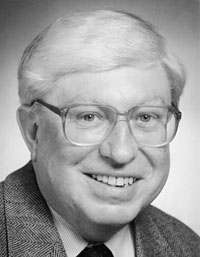 Prof. Dr. Gerhard Ertl is a world-renowned leader in surface science, electrochemistry, catalysis, and the dynamics of nonlinear chemical systems. His work on the oxidation of CO on platinum produced examples of spatial self-organization and spatio-temporal pattern formation that have had profound influence not only in the area of catalytic oxidation but also in biological pattern formation and morphogenesis.
Prof. Dr. Gerhard Ertl is a world-renowned leader in surface science, electrochemistry, catalysis, and the dynamics of nonlinear chemical systems. His work on the oxidation of CO on platinum produced examples of spatial self-organization and spatio-temporal pattern formation that have had profound influence not only in the area of catalytic oxidation but also in biological pattern formation and morphogenesis.
A native of Stuttgart, Germany, he received his education at the Technical University of Stuttgart, the University of Paris, and the Technical University of Munich. He was Professor and Director of the Institute for Physical Chemistry at the Technical University of Hannover, then the Technical University of Munich, before becoming Director of the Fritz Haber Institute of the Max Planck Gesellschaft in Berlin. He has been vice president of the German Science Foundation (DFG) since 1995. He has been a visiting professor at the California Institute of Technology (Chemical Engineering), University of Wisconsin (Physics), and University of California at Berkeley (Chemistry). The scope of his contributions is indicated by the variety of awards he has received including the Liebig Medal of the German Chemical Society, the Hewlett-Packard Europhysics Prize of the European Physical Society, the Japan Prize of the Science and Technology Foundation of Japan, the Bunsen Medal, the M. W. Welch Award of the American Vacuum Society, the Wolf Prize, three honorary professorships at German Universities, and an honorary doctoral degree from the University of Münster. He is on the editorial boards of seven journals including Science, Angewandte Chemie, and Chemical Physics Letters. He is co-editor of Surface Science Reports, Zeitschrift für Physikalische Chemie, and the Springer Series in Surface Science. The G. F. Smith Memorial Lectureship is the latest of his many named lectureships. He has authored over 500 peer-reviewed papers.